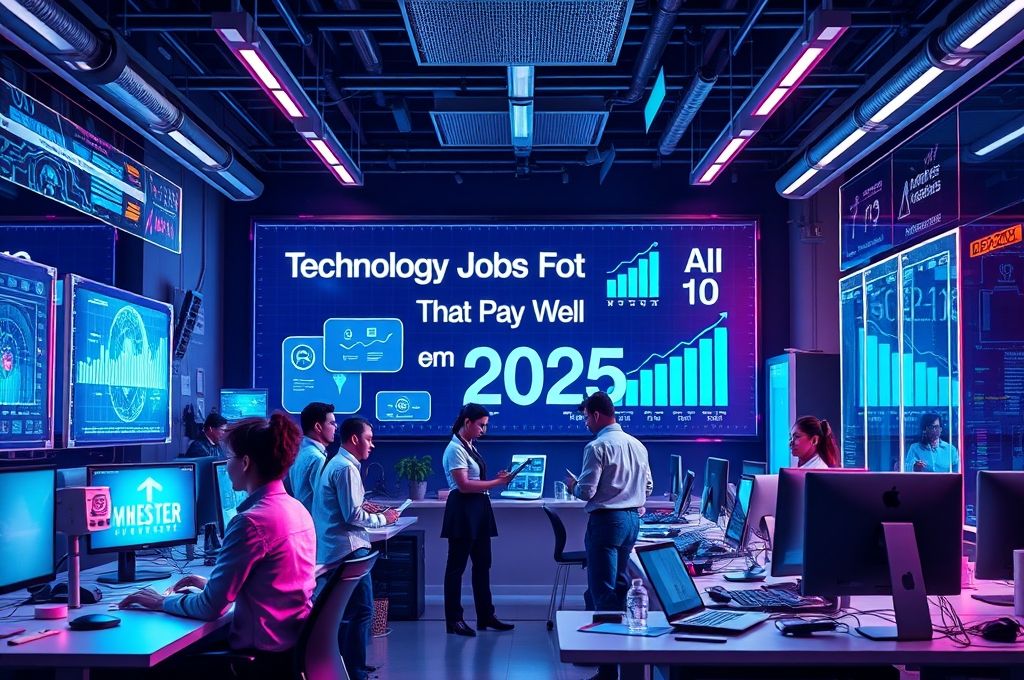The Future of Work is Here – And It’s Digital
Imagine waking up every morning excited to go to work — not because of free coffee or a fancy office, but because your job pays well, offers flexibility, and lets you shape the future. That’s the reality for thousands of professionals in high-paying technology roles today. And by 2025, this trend won’t just continue — it will accelerate.
Technology isn’t just changing how we live; it’s redefining what we do for a living. From artificial intelligence to cybersecurity, cloud computing to data science, tech careers are no longer limited to computer geniuses in hoodies. They’re diverse, accessible, and among the most lucrative professions in the world.
In this article, we’ll explore the Top 10 Technology Jobs That Pay Well in 2025, based on salary trends, industry demand, and long-term growth potential. Whether you’re a student planning your career path, a professional considering a switch, or simply curious about where the future is headed, this list will give you real insights into the jobs that are shaping tomorrow — and paying six figures (or more) to do it.
We’ll break down each role, explain what it involves, how much you can earn, and what skills you need to get started. No jargon. No fluff. Just clear, practical information that helps you make smarter decisions about your future.
So, if you’ve ever wondered whether learning to code, analyzing data, or protecting digital systems could lead to a high-paying career — the answer is yes. Let’s dive in.
1. Artificial Intelligence (AI) Engineer
Artificial Intelligence is no longer science fiction. It powers your Netflix recommendations, helps doctors diagnose diseases, and even writes articles like this one. Behind these innovations are AI Engineers — the architects of intelligent systems.
An AI Engineer designs, builds, and deploys machine learning models and AI applications. They work with algorithms, neural networks, and large datasets to create systems that can “learn” and make decisions. Think of them as the brain behind chatbots, self-driving cars, and voice assistants.
By 2025, the demand for AI talent is expected to grow by over 40%, according to the U.S. Bureau of Labor Statistics. Companies across healthcare, finance, retail, and manufacturing are racing to integrate AI into their operations.
Average Salary in 2025: $165,000 – $220,000 per year
Top earners in Silicon Valley or at major tech firms can make over $250,000 with bonuses and stock options.
To become an AI Engineer, you typically need:
- A degree in computer science, mathematics, or engineering
- Strong programming skills (Python, R, Java)
- Knowledge of machine learning frameworks like TensorFlow or PyTorch
- Experience with data modeling and algorithm development
The best part? You don’t need to be a PhD to get started. Online courses, bootcamps, and certifications from platforms like Coursera, edX, and Udacity are making AI skills more accessible than ever.
Pro Tip: Start with a project — like building a simple image classifier or a recommendation engine. Real-world experience matters more than credentials.
AI isn’t just the future — it’s already here. And those who understand how to build it will be among the highest-paid professionals in the world.
2. Data Scientist
If data is the new oil, then Data Scientists are the drillers, refiners, and strategists who turn raw information into gold.
Every time you click, scroll, or search online, you generate data. Companies collect this data to understand customer behavior, improve products, and predict trends. But without someone to interpret it, it’s just noise.
That’s where Data Scientists come in. They use statistics, programming, and domain expertise to extract meaningful insights from complex datasets. They answer questions like:
- Why are customers leaving our app?
- Which marketing campaign performed best?
- How can we reduce operational costs?
Their work drives decisions at companies like Amazon, Google, and Netflix — and their pay reflects their value.
Average Salary in 2025: $145,000 – $190,000 per year
Senior data scientists with experience in AI or big data platforms can earn well over $200,000.
Key skills include:
- Proficiency in Python, SQL, and R
- Experience with tools like Tableau, Power BI, or Apache Spark
- Understanding of machine learning and statistical analysis
- Strong communication skills to explain findings to non-technical teams
Real-World Example: A data scientist at a retail company might analyze purchase patterns to optimize inventory and reduce waste — saving millions annually.
The field is competitive, but the barrier to entry is lower than many think. Many successful data scientists come from non-traditional backgrounds — economics, psychology, even music — as long as they’re willing to learn the technical side.
Why it matters in 2025: As businesses rely more on data-driven decisions, the demand for skilled data scientists will only grow. This isn’t just a job — it’s a superpower in the digital economy.
3. Cybersecurity Analyst
Imagine being the digital guardian of a hospital, bank, or government agency. That’s the role of a Cybersecurity Analyst — and it’s one of the most critical tech jobs of our time.
With cyberattacks increasing by 68% globally in 2023 alone, organizations are investing heavily in protection. Hackers target everything from personal data to national infrastructure, making cybersecurity a top priority.
Cybersecurity Analysts monitor networks for threats, respond to breaches, and implement security measures like firewalls, encryption, and multi-factor authentication. They’re the first line of defense against ransomware, phishing, and data theft.
Average Salary in 2025: $130,000 – $175,000 per year
Experts in high-risk industries (finance, defense, healthcare) can earn over $200,000.
To succeed in this field, you’ll need:
- Knowledge of operating systems, networks, and security protocols
- Certifications like CompTIA Security+, CISSP, or CEH
- Problem-solving skills and attention to detail
- The ability to stay calm under pressure during attacks
Story Time: In 2021, a single cybersecurity analyst detected a breach in a major energy pipeline before it caused widespread damage. His quick action saved the company millions and prevented a national crisis.
One of the best things about cybersecurity? It’s accessible. Many professionals enter the field through certifications and hands-on training, not necessarily a computer science degree.
Future Outlook: By 2025, there will be 3.5 million unfilled cybersecurity jobs worldwide. That means high demand, job security, and excellent pay.
If you enjoy puzzles, problem-solving, and protecting others, this could be your calling.
4. Cloud Solutions Architect
The cloud isn’t just in the sky — it’s where almost every business stores its data, runs its apps, and scales its operations. And the masterminds behind these cloud systems are Cloud Solutions Architects.
These professionals design and manage cloud infrastructure using platforms like Amazon Web Services (AWS), Microsoft Azure, and Google Cloud. They ensure systems are secure, scalable, and cost-efficient.
Think of them as digital city planners. Just as an architect designs buildings that are safe, functional, and beautiful, a Cloud Architect designs systems that handle millions of users, protect sensitive data, and adapt to changing needs.
Average Salary in 2025: $150,000 – $195,000 per year
Top architects at tech giants or consulting firms can earn $220,000+.
Required skills include:
- Deep knowledge of cloud platforms (AWS is the most in-demand)
- Networking, storage, and security expertise
- Programming skills (Python, Bash, or Go)
- Certifications like AWS Certified Solutions Architect or Azure Architect
Did You Know? Netflix runs entirely on AWS. A team of cloud architects ensures that 200 million users can stream movies simultaneously without crashing the system.
The shift to remote work and digital transformation has made cloud skills essential. Even traditional industries like agriculture and manufacturing are moving to the cloud.
Why it’s hot in 2025: Cloud spending is expected to reach $1.5 trillion by 2025, according to Gartner. That means more companies need experts who can design and manage these systems.
And the best part? You can start small. Many cloud architects begin as developers or IT support and transition through certifications and real-world projects.
This is a career with room to grow — and pay to match.
5. DevOps Engineer
In the past, software development and IT operations worked in silos. Developers built code, and operations teams deployed it — often leading to delays, bugs, and frustration.
Enter the DevOps Engineer — the bridge between creation and delivery.
DevOps (a blend of “Development” and “Operations”) is a culture and practice that automates and streamlines software development. DevOps Engineers use tools like Docker, Kubernetes, Jenkins, and Git to ensure code is tested, deployed, and updated quickly and reliably.
They’re like air traffic controllers for software — ensuring smooth, fast, and safe releases.
Average Salary in 2025: $140,000 – $185,000 per year
Senior DevOps Engineers with cloud and automation expertise can earn over $200,000.
Key skills:
- Scripting and automation (Bash, Python, PowerShell)
- CI/CD pipelines (Continuous Integration/Continuous Deployment)
- Containerization and orchestration tools
- Cloud platform experience
Example: When Instagram rolls out a new feature to millions of users overnight, it’s DevOps engineers who make sure it goes live without crashing the app.
The demand for DevOps has exploded as companies adopt agile development and cloud-native applications. It’s no longer a niche role — it’s a standard in modern tech teams.
What makes it great in 2025? Speed and efficiency are everything. Companies that deploy software faster gain a competitive edge. DevOps Engineers make that possible.
And unlike some tech roles, DevOps is highly collaborative. You’ll work closely with developers, QA teams, and managers — perfect if you enjoy teamwork and problem-solving.
If you like automation, efficiency, and seeing your work go live instantly, this might be your dream job.
6. Full-Stack Developer
Want the freedom to build anything — from a mobile app to a full website — and get paid well for it? Meet the Full-Stack Developer.
A full-stack developer works on both the front end (what users see) and the back end (the server, database, and logic). They’re the Swiss Army knives of software development — versatile, in-demand, and highly paid.
Whether it’s a startup launching a new app or a bank updating its online portal, full-stack developers are essential.
Average Salary in 2025: $120,000 – $160,000 per year
Freelancers and senior developers can charge $100+ per hour.
Common tech stack:
- Frontend: HTML, CSS, JavaScript, React, Angular
- Backend: Node.js, Python (Django), Ruby on Rails, PHP
- Databases: MongoDB, PostgreSQL, MySQL
- Tools: Git, REST APIs, cloud platforms
Fun Fact: Facebook was originally built by a single full-stack developer — Mark Zuckerberg.
The beauty of this role is flexibility. You can work remotely, freelance, or join a tech company. Many developers start with online courses and build portfolios by creating real projects.
Why it’s booming in 2025: Digital transformation is everywhere. Every business needs a website, an app, or a digital service. That means constant demand for developers who can build it all.
And with low-code/no-code tools rising, full-stack developers are even more valuable — they can customize and scale what generic tools can’t.
Tip: Build a personal project — a blog, a to-do app, or a small e-commerce site. It’s the best way to learn and impress employers.
This isn’t just a job — it’s a creative outlet with serious earning potential.
7. Machine Learning Engineer
While AI Engineers focus on broad intelligent systems, Machine Learning (ML) Engineers specialize in creating models that learn from data.
They’re the ones who train algorithms to recognize faces, predict stock prices, or recommend songs on Spotify. Their work is deeply technical, blending data science and software engineering.
ML Engineers don’t just analyze data — they build systems that act on it.
Average Salary in 2025: $155,000 – $210,000 per year
Top earners in AI labs or tech giants can make $250,000+.
Required skills:
- Advanced knowledge of Python and ML libraries (scikit-learn, Keras)
- Data preprocessing and model evaluation
- Cloud ML services (AWS SageMaker, Google AI Platform)
- Strong math and statistics background
Real Impact: ML Engineers helped develop AI models that detect cancer in medical scans with higher accuracy than some human doctors.
The field is growing fast. By 2025, over 70% of enterprises will use machine learning in some form, according to IDC.
While the role is advanced, the path is clear:
- Learn Python and data analysis
- Study machine learning fundamentals
- Build and deploy models using real datasets
- Contribute to open-source projects or Kaggle competitions
Why it’s worth it: ML Engineers are shaping the future of automation, healthcare, finance, and more. If you love data and want to build intelligent systems, this is your lane.
And yes — the paycheck reflects how valuable these skills are.
8. Blockchain Developer
Blockchain isn’t just about Bitcoin. It’s a revolutionary technology that enables secure, transparent, and decentralized systems — from digital contracts to supply chain tracking.
And the people building these systems? Blockchain Developers.
They create decentralized applications (dApps), smart contracts, and blockchain platforms using languages like Solidity (for Ethereum) and tools like Web3.js.
Think of them as the builders of the next internet — Web3 — where users control their data and transactions.
Average Salary in 2025: $140,000 – $180,000 per year
Top developers in DeFi (Decentralized Finance) or NFT projects can earn much more, especially with token incentives.
Skills needed:
- Understanding of cryptography and distributed systems
- Proficiency in Solidity, JavaScript, or Rust
- Experience with Ethereum, Solana, or other blockchains
- Knowledge of smart contract security
Case Study: A blockchain developer created a smart contract that automatically pays farmers when crop sensors confirm harvest — cutting out middlemen and reducing fraud.
Despite market fluctuations, blockchain adoption is growing in finance, healthcare, and logistics.
Why 2025 is key: Governments and corporations are exploring blockchain for identity verification, voting systems, and asset tracking. That means more stable, long-term jobs beyond crypto speculation.
It’s a niche field, but early adopters are reaping the rewards — both financially and professionally.
If you’re curious, start with free courses on platforms like Coursera or build a simple token on a test network. The ecosystem rewards hands-on learners.
9. UX/UI Designer (Tech-Focused)
Great technology means nothing if people can’t use it. That’s where UX/UI Designers come in.
UX (User Experience) focuses on how a product feels — is it intuitive? Enjoyable? Efficient?
UI (User Interface) deals with the visual design — colors, buttons, layouts.
Together, they ensure apps, websites, and software are not just functional, but delightful to use.
Average Salary in 2025: $110,000 – $150,000 per year
Senior designers at top tech firms can earn $170,000+.
Skills include:
- Proficiency in Figma, Adobe XD, or Sketch
- User research and wireframing
- Prototyping and usability testing
- Collaboration with developers and product managers
Example: Apple’s success isn’t just about technology — it’s about design. A UX/UI team ensures every swipe, tap, and animation feels natural.
The demand for tech-savvy designers is rising as companies compete on user experience.
What’s new in 2025? AI-powered design tools are emerging, but human creativity is still irreplaceable. The best designers understand psychology, accessibility, and business goals.
You don’t need a computer science degree — many come from art, psychology, or communications. What matters is a portfolio that shows problem-solving and empathy.
Tip: Redesign a popular app’s interface to solve a common user complaint. It’s a powerful way to showcase your skills.
In a world of complex technology, UX/UI Designers are the human touch — and they’re more important than ever.
10. Robotics Engineer
From warehouse bots to surgical robots, machines are becoming smarter and more autonomous. And the engineers behind them? Robotics Engineers.
They design, build, and program robots that can move, sense, and interact with the physical world. Their work spans manufacturing, healthcare, agriculture, and space exploration.
Average Salary in 2025: $135,000 – $180,000 per year
Experts in AI-integrated robotics can earn over $200,000.
Skills required:
- Mechanical and electrical engineering knowledge
- Programming in C++, Python, or ROS (Robot Operating System)
- Sensors, actuators, and control systems
- AI and computer vision (for advanced robots)
Inspiring Example: During the pandemic, robotics engineers developed UV-disinfecting robots that cleaned hospitals safely and efficiently.
While robotics is complex, the field is opening up. Universities, bootcamps, and online labs (like NVIDIA’s Isaac Sim) make learning more accessible.
Why 2025 matters: Automation is accelerating. Amazon uses over 750,000 robots in its warehouses. Tesla’s Optimus robot aims to revolutionize personal assistance.
This isn’t sci-fi — it’s the next industrial revolution.
And robotics engineers are at the heart of it.
If you love building things that move and think, this career combines creativity, engineering, and impact — with serious earning power.
How to Get Started in These High-Paying Tech Jobs
You might be thinking: “These jobs sound amazing, but where do I begin?”
The good news? You don’t need a Ivy League degree or 10 years of experience to start.
Here’s a simple roadmap:
- Pick a field that excites you — not just the salary. Passion fuels persistence.
- Learn the basics online — Free or affordable courses on Coursera, edX, freeCodeCamp, or Udemy can teach you Python, data analysis, or cloud computing.
- Build projects — Employers care about what you can do, not just what you know. Create a portfolio.
- Get certified — Certifications from Google, AWS, Microsoft, or CompTIA add credibility.
- Network and apply — Join tech communities, attend meetups, and apply for internships or junior roles.
Remember: Many of today’s top tech leaders started with zero experience. What they had was curiosity and the courage to start.
And don’t forget — soft skills matter. Communication, teamwork, and problem-solving are just as important as coding.
Conclusion: Your Future in Tech Starts Now
We’ve covered the Top 10 Technology Jobs That Pay Well in 2025 — from AI and data science to cybersecurity and robotics. These aren’t just high-paying roles; they’re careers that shape the future, solve real problems, and offer freedom and flexibility.
The tech industry is evolving fast, but one thing remains constant: opportunity favors those who learn, adapt, and take action.
Whether you’re 18 or 48, a student or a parent, changing careers is possible. The tools are online. The demand is real. The salaries are impressive.
So ask yourself: What step can I take today?
Maybe it’s signing up for a free Python course.
Or redesigning a website for fun.
Or learning what blockchain really is.
Small steps lead to big changes.
And who knows? In 2025, you might be the one earning six figures, working remotely, and building the future — one line of code at a time.
What tech job inspires you the most? Share your thoughts in the comments below — let’s build a community of future tech leaders together.
And if you found this article helpful, please share it with someone who’s ready to start their tech journey. The future is bright — and it’s waiting for you.

Danilo Ferreira is a passionate entrepreneur, travel, and financial freedom enthusiast, always seeking new ways to expand his horizons and live with purpose. Driven by a high-performance mindset, he combines discipline and curiosity to achieve ambitious goals, exploring the world while building projects that reflect his vision of independence and continuous growth.







